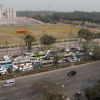Tony Blair says world is better as a result of Iraq War

Tony Blair says the world would be "in a worse position" had he not taken the decision to invade Iraq.
The former PM said despite the "terrible consequences", removing Saddam Hussein "moved with the grain" of what was to come in the region.
He also said it would be "far better" if he had challenged intelligence on Iraq's weapons in the run-up to war.
The official inquiry into the 2003 war was strongly critical of Blair's government and UK military chiefs.
Sir John Chilcot's report, published on Wednesday, said Blair had overstated the threat posed by Saddam Hussein, sent ill-prepared troops into battle and had "wholly inadequate" plans for the aftermath of the conflict.
Speaking on BBC Radio 4's Today programme, Blair insisted that although mistakes had been made, the decision to join the US-led invasion had been the right one.
And he hit back at claims he had secretly committed the UK to help US President George W Bush topple Saddam Hussein and then overstated the threat posed by Saddam Hussein's alleged weapons of mass destruction to sell the war to the public and MPs.
'Flawed' intelligence
In a December 2001 memo, among more than 30 such notes released with the Chilcot report, Blair said to Bush that he would be "with you, whatever", before setting out some of the conditions he believed the US would need to meet to attract support, including seeking UN authorisation.
Blair told Today he had not "made some irrevocable decision to go to war" at that point.
"We were giving the United States a very clear commitment that we would be alongside them in dealing with this issue," he said.
The Chilcot report said Saddam Hussein had posed "no imminent threat" at the time of the invasion, which had been launched on the basis of "flawed" intelligence.
It also found that warnings about the increased risk of terrorist activity and regional instability had not been shared with the public and MPs.
The inquiry's chairman, Sir John Chilcot, said Blair and his ministers should not have accepted the intelligence reports on Saddam's weapons at face value.
Blair said he had relied on these reports, but acknowledged: "It would have been far better to have challenged them more clearly."
'Struggle'
He added: "It wasn't that I wanted to believe it. I did believe it, and one of the reasons for that was because Saddam Hussein had used these weapons against his own people."
The former prime minister said he understood "all the criticisms" of the invasion, but said: "When I look at it today I think still that we moved with where the grain of the future is going to be in these countries and this region."
Blair told interviewer John Humphrys people would not accept that he meant his regret over mistakes in the Iraq War until he disowned the decision to join the US coalition to topple Saddam Hussein.
But he said: "I don't believe this struggle was in vain."
He added: "I can regret the mistakes and I can regret many things about it - but I genuinely believe not just that we acted out of good motives and I did what I did out of good faith, but I sincerely believe that we would be in a worse position if we hadn't acted that way. I may be completely wrong about that."
He argued that had Saddam Hussein been left in power, "he would have gone back to his [weapons of mass destruction] programmes again".
And if he had been in power during the Arab Spring in 2011, "I believe he would have tried to keep power" in the way that Syria's President, Bashar al-Assad, had done.
Instead, Blair said, Iraq had a government "accepted as legitimate, the product of an election".
'Destroyed reputation'
Humphrys suggested some people thought Blair was deluded.
"Why don't they just say they disagree?" the former prime minister replied.
Following the publication of Sir John's report, Blair held a two-hour press conference in which he apologised to the families of those killed in the Iraq War, accepting that they will never "forget or forgive him".
He said he felt sorrow and regret beyond what "people may ever know" at the loss of life.
Shadow health secretary Diane Abbott told Today Blair had "destroyed his own reputation".
She said his Labour government had done some "amazing things", but "their reputation has bled to death in the sands of Iraq".
A spokesman for some of the families of the 179 British service personnel and civilians killed in Iraq between 2003 and 2009 said their loved ones had died "unnecessarily and without just cause and purpose".
The spokesman said all options were being considered, including asking those responsible for the failures identified in the report to "answer for their actions in the courts if such process is found to be viable".
Prime Minister David Cameron, who voted for war in 2003, told MPs it was important to "really learn the lessons for the future" and to improve the workings of government and how it treats legal advice.
Labour leader Jeremy Corbyn - who voted against military action - apologised on behalf of the party.
He said the report proved the Iraq War had been an "act of military aggression launched on a false pretext", something he said which has "long been regarded as illegal by the overwhelming weight of international opinion".

 For all latest news, follow The Daily Star's Google News channel.
For all latest news, follow The Daily Star's Google News channel. 








Comments